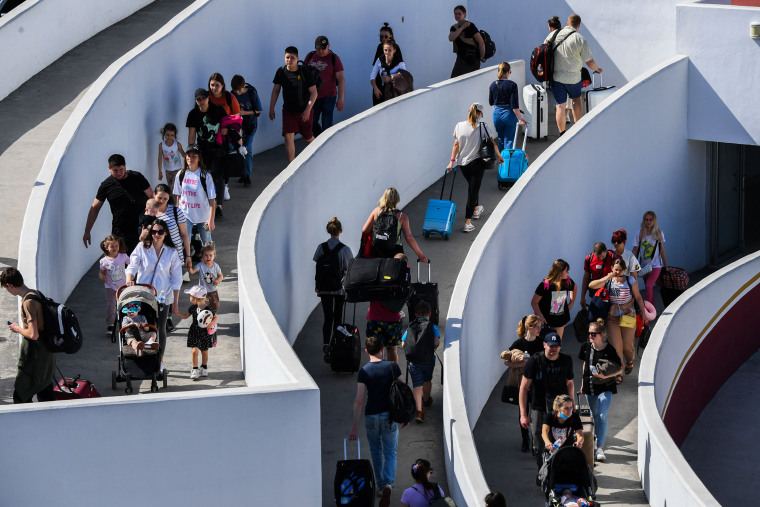More than 71,000 Ukrainians have arrived in the U.S. since President Joe Biden announced in March that his administration would welcome up to 100,000 Ukrainians fleeing the country’s war with Russia, according to new data from the Department of Homeland Security.
Refugee advocates say the numbers are welcome news, but say the Biden administration is not responsible for bringing in the bulk of those who have found their way here.
The DHS data suggests that most of those who have entered the U.S. so far came on visas they held or by crossing the U.S.-Mexico border, and not through the Biden administration's Uniting for Ukraine web portal that allows Americans to sponsor Ukrainians they know.
While more than 22,000 have crossed over the southern border since March 24, that pathway has largely been shut down as the web portal launched and Ukrainians at the border started being subjected to the Covid-related public health order known as Title 42, which blocks many migrants to claim asylum.
DHS said more than 15,000 Ukrainians have entered the U.S. after being approved for sponsorship online and more are expected to come as another 23,000 have been approved but not yet traveled to the U.S. Those approved are responsible for booking their own travel to the U.S.
Krish O’Mara Vignarajah, president and CEO of Lutheran Immigration and Refugee Service, said the Biden administration is inflating the number of Ukrainians it has worked to bring in, since only 15,000 have come through the system it set up.
“We shouldn’t count towards the 100,000 commitment those who weren’t actually processed through the Uniting for Ukraine program. I think the figures show the current ad hoc nature of the program,” said Vignarajah. “Ukrainian refugees are creatively exploring every avenue in order to seek refuge in the U.S. But we should be making it as simple and straightforward as possible.”
DHS referred NBC News to the White House National Security Council for comment.
In a statement, an NSC spokesperson said, “We are proud to be fulfilling President Biden’s commitment to welcome 100,000 displaced Ukrainians and others fleeing Russia’s aggression who are seeking refuge in the United States. We look forward to continuing to welcome Ukrainians to our country as we continue to take steps to support those fleeing the ongoing war.”
Only 300 Ukrainians have been resettled through the traditional U.S. Refugee Admissions Program, which uses federal funds to bring in United Nations-vetted refugees and resettle them in communities with resources to help find doctors, schools, jobs and connections to their cultures.
While Biden promised to revamp the program after it was drastically cut by the Trump administration, his administration has used emergency humanitarian parole powers to quickly, but temporarily, bring in Afghans and Ukrainians. Many Afghans who served with American troops were left stranded in the now Taliban-controlled country while others who were brought to the U.S. find themselves in long lines to apply for benefits like work authorization.
Lacy Broemel, a policy analyst at International Refugee Assistance Project, said the high number of Ukrainians being admitted to the U.S. shows the Biden administration could bring in more refugees from other countries if it was willing to do so.
“This is a reflection that when they have the political will, they can do it. We want to see that same will applied to Afghans who are still awaiting parole and other populations who are awaiting admission through the U.S. refugee program,” said Broemel.

